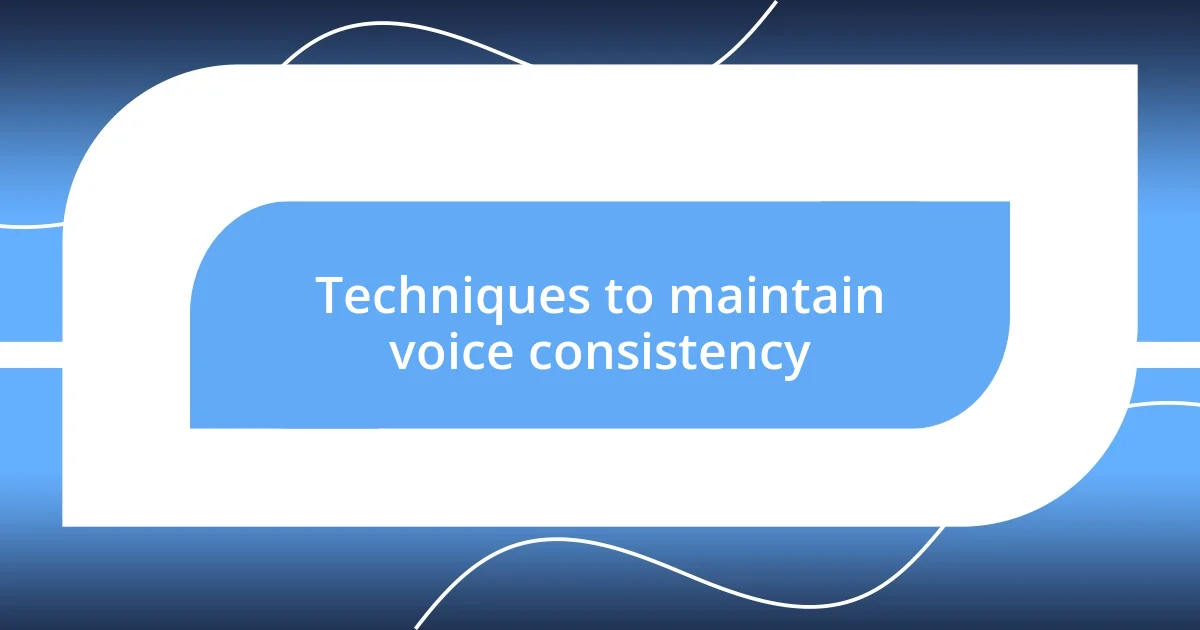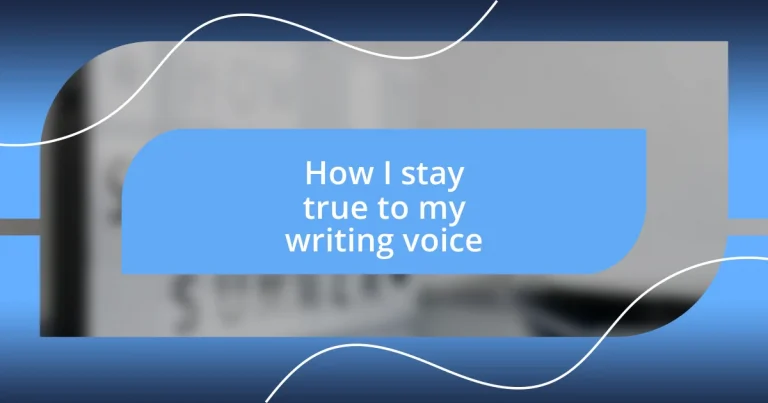Key takeaways:
- Understanding your writing voice involves recognizing its uniqueness and allowing personal experiences to enhance authenticity.
- Identifying your unique style requires self-reflection, experimentation with different genres, and engaging with others for feedback.
- Celebrating your writing journey, no matter the size of accomplishments, fosters growth and community support among writers.

Understanding your writing voice
Understanding your writing voice starts with recognizing that it’s uniquely yours. I remember the first time I shared my work with a close friend, and he pointed out how my personality shone through my words. It was an illuminating moment for me; I realized that my voice wasn’t just a collection of words but an extension of who I am.
What emotions do you want to convey? I’ve found that when I write about topics that genuinely ignite my passion, my voice naturally comes alive. For instance, when discussing the joys of travel, my excitement spills over into my writing, making the reader feel like they’re right there alongside me, experiencing the adventure.
Your voice can evolve just as you do. I often reflect on my earlier pieces and notice how they differ from my current style. Each piece I write teaches me something new about myself, enhancing my voice in the process. Have you ever felt that growth in your own writing? Embracing your evolution allows for a richer, more authentic expression in everything you create.

Identifying your unique style
Identifying your unique style begins with self-reflection. I remember taking a moment to read through my past works, noticing the certain phrases and rhythms that felt distinctly mine. This exploration helped me realize that my storytelling often has a whimsical touch, stemming from my love for fantasy. Recognizing these patterns sparked a sense of pride and clarity in my writing journey.
As I dug deeper, I found value in experimenting with different genres and formats. For example, I once tried my hand at poetry, and it revealed a more vulnerable side of me that I hadn’t fully tapped into before. This experience highlighted the importance of stepping out of my comfort zone to discover new nuances of my voice. Have you ever tried writing something completely different from your usual style?
Engaging with others is another fantastic way to identify your style. Through writing groups and workshops, I’ve heard feedback that illuminates aspects of my voice I hadn’t consciously noticed. For instance, a fellow writer commented on my ability to balance humor with serious themes, something I now intentionally cultivate. Your unique voice is not just an individual endeavor; it’s often shaped through interactions and feedback from others.
| Approach | Description |
|---|---|
| Self-Reflection | Review past works to identify recurring phrases and tones unique to you. |
| Experimentation | Try different genres or formats to uncover new facets of your voice. |
| Engagement | Seek feedback from others to gain insights into your style that you may overlook. |

Embracing authenticity in writing
Embracing authenticity in writing is about showing up as your true self on the page. I once wrote a deeply personal essay about overcoming a struggle, and the outpouring of responses surprised me. Readers connected with my vulnerability, sharing their own stories and reminding me that authenticity resonates more than polished perfection.
- Write from your heart; authenticity often comes when you let go of fear and embrace your true experiences.
- Don’t shy away from imperfection, as real life is messy—sometimes, those raw moments create the most profound impact.
- Capture your voice by including your quirks. Whether it’s a favorite phrase or a unique way of connecting ideas, these elements make your writing genuinely yours.
When I stopped worrying about what others might think, I found that my writing flourished. For example, during a recent project, I decided to inject humor into a serious topic. It felt risky, but that bravery allowed my personality to shine, transforming the piece into something both relatable and enjoyable. I realized that authenticity is not just about honesty; it’s also about embracing the full spectrum of who you are as a writer.

Techniques to maintain voice consistency
Consistency in voice requires deliberate techniques. One method I’ve embraced is creating a writing schedule that prioritizes practice. When I set aside regular time to write, I find that my unique voice naturally emerges, creating a rhythm that feels authentic to me. Have you noticed how routine can ground you in your individual style?
Another technique I utilize involves setting clear intentions before each piece. I sometimes ask myself, “What feeling do I want to evoke?” This question allows me to align my tone and choice of vocabulary with the emotion I aim to convey. I remember writing an article about a challenging experience, and by focusing on the intention to inspire resilience, my writing transformed into a powerful, cohesive narrative.
Lastly, revisiting my favorite authors and analyzing their voice has been invaluable. I often jot down passages that resonate with me and study what makes them unique. For example, I once found inspiration in a novel that played with sentence structure in captivating ways, encouraging me to experiment with my own. Seeing the impact of voice in others helped strengthen my own. How do you draw inspiration from writers you admire? In my case, it’s about finding elements that feel close to me and making them a part of my writing toolkit.

Seeking feedback on your writing
Seeking feedback on my writing has been a game changer. I remember sharing a draft with a close friend who’s an avid reader. Their honest critique was eye-opening, highlighting areas that needed clarity while also uncovering parts that truly resonated with them. This taught me that external perspectives can bring fresh insights that I might overlook.
When I actively seek feedback, I approach it with an open mind. For instance, during a writing workshop, I was hesitant to share a poem I had worked on for months. But the encouragement to share led to a discussion that illuminated the emotional texture of my work in ways I had never considered. It reminded me of the beauty in vulnerability; sharing my writing allowed me to connect with others on a deeper level.
Moreover, I’ve learned that not all feedback is created equal. I once received conflicting advice on an article I was excited about, which initially left me confused. In the end, I decided to trust my instincts and the feedback that aligned most with my vision. This experience solidified my belief that, while feedback is essential, staying true to my voice and vision remains paramount. Have you ever faced a similar dilemma? Engaging in this process helps sharpen my writing and fortifies my unique style.

Revising while staying true
When it comes to revising while staying true to my voice, I often find myself dancing with the words on the page. I remember a time when I was revising a short story that felt a bit flat after the initial draft. I took a step back, read it out loud, and realized that some phrases didn’t reflect my authentic tone. I immediately changed those lines, infusing them with the passion and energy I felt while writing the piece. Have you ever reread your work and felt like it just didn’t sound like you?
During revisions, I’m also careful about not over-editing. In one instance, I was so focused on getting every word perfect that I lost the spontaneous rhythm that made the draft special. I had to remind myself that tweaking is part of the process, but it should never overshadow my unique style. Embracing this balance allows me to refine my work without sacrificing what makes it mine.
Lastly, I often find myself asking, “Does this resonate with me?” as I revise. Once, while working on a personal essay, I realized a section didn’t align with my initial intention because I had made it overly technical. I decided to rewrite it in a more conversational style, reflecting my authentic voice. That shift turned it into a piece that genuinely represented me. How do you navigate the revisions in your writing while holding on to what feels true?

Celebrating your writing journey
Every step of my writing journey deserves celebration, no matter how small. I still remember the thrill of finishing my first long poem—my heart raced as I typed the last line. That sense of accomplishment was contagious; it fueled my desire to keep creating. Have you felt that joyous rush after completing a piece? It’s important to acknowledge these moments, as they remind us of why we write in the first place.
Reflecting on my progress has been equally vital. I often glance back at early drafts and see how far I’ve come, both in skill and confidence. It brings a smile to my face to realize I once struggled with simple word choices that now flow effortlessly. Isn’t it fascinating how we evolve? Celebrating these milestones reassures me that every awkward phrase and hesitant sentence was indeed part of my growth.
Engaging with my writing community adds another layer of celebration. I’ve found that sharing my achievements—like finishing a manuscript or receiving positive feedback—encourages others to acknowledge their journeys too. Just the other day, a friend and I exchanged stories of our latest victories, big and small; it reminded me how uplifting it is to cheer each other on. What do you think happens when we celebrate together? It creates a sense of camaraderie that propels us further on our writing paths.














